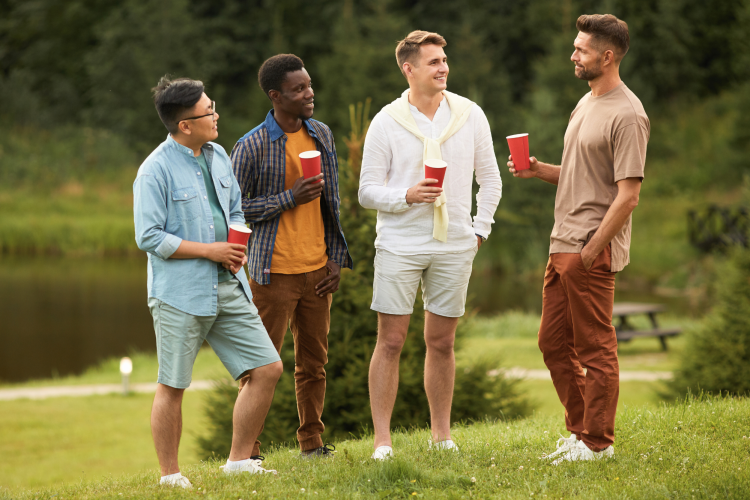Open Ended Questions Vs Closed Questions: How To Ask Them [With Examples]

Asking open-ended questions can be a great way to build trust and deepen your relationships. If you want to engage your students in the classroom, strengthen your friendships, or simply become a better communicator, open-ended questions invite dialogue instead of shutting it down. They encourage people to share more than a one-word response, which can reveal not just their feelings but also how they think and approach the world.
An article on Forbes mentioned that open-ended questions give clarity in conversations, which creates a stronger connection between you and your friends. Open-ended questions also avoid assumptions and give the other person space to answer honestly and comfortably.
But the value of open-ended questions doesn’t stop at relationships. They are a powerful tool to put in your list of critical thinking questions. By asking someone to explain, interpret, or reflect, you help them explore their reasoning instead of settling for quick, surface-level answers. This makes open-ended questions useful in the classroom, the workplace, or any situation where curiosity and problem-solving matter — beyond clear-cut true or false questions.
Jump to Section
Open-ended Questions Vs Closed-ended Questions

Asking questions provides a great opportunity to get to know someone. Both open and closed questions have their place, but they serve very different purposes.
Closed-ended questions have definitive answers. They often take the form of yes or no questions or short factual statements. For example: “Did you enjoy the movie?” or “What time does the meeting start?” These questions are efficient when you need clarity or specific information. They’re especially useful for small talk, checking details, or keeping a conversation brief.
Open-ended questions, on the other hand, invite more than a one-word answer. They prompt reflection, explanation, and personal insight. For example: “What did you enjoy most about the movie?” or “How do you think we could make the meeting more productive?” These kinds of questions foster stronger connections, but they also sharpen critical thinking skills. They push people to analyze, compare, and articulate ideas in ways that closed questions simply don’t allow. Use open-ended questions if you'd like to know more about someone or use them in your list of how well do you know me questions.
Closed questions give you facts, while open questions reveal perspectives, reasoning, and experiences. Knowing when to use each type can make you not only a better friend but also a more thoughtful communicator. For a fun game to play with closed questions, you can have a go at the Put A Finger Down trend.
What 5 Words Typically Start An Open-ended Question?
Asking open-ended questions is a great way to spark engaging responses. If you want to go beyond yes-or-no answers, start with words that naturally invite explanation. Words like “what,” “how,” “why,” “can,” and “describe” encourage people to expand on their thoughts.
For example, instead of asking “Did you like the class?” you might ask “What part of the class challenged you the most?” That small shift turns a simple check-in into an opportunity to hear deeper insights. These question starters not only help you strengthen relationships but also inspire reflection and critical thinking by asking someone to explain reasoning or share perspectives.
What Are The 5 W Open-ended Questions?

Another simple framework for creating open-ended questions is the classic 5 Ws: “who,” “what,” “when,” “where,” and “why.” These starters make it easy to build trust and connection because they leave room for detailed answers and are more stringent than hypothetical questions.
For example, “Who influenced the way you see this situation?” or “Why do you think that approach worked?” Each of these opens the door to more than facts — they invite stories, analysis, and reasoning. This makes the 5 Ws just as useful in a heart-to-heart with a friend as in a classroom or team meeting where deeper thinking is encouraged.
What Are Examples of Open-ended Questions?
Open-ended questions encourage people to go beyond short replies and share their perspectives in greater depth. Instead of limiting someone to a yes or no, they create space for reflection, storytelling, and reasoning. This can spark meaningful conversations, help you understand another person’s values, and even challenge you to think in new ways.
For instance, instead of asking “Did you like the book?” you might ask:
- “What stood out to you most in the book?”
- “How did the story change the way you see the topic?”
- “Why do you think the author chose that ending?”
- “Who do you relate to most in the story, and why?”
These kinds of questions don’t just build connection; they also encourage critical thinking by prompting people to explain their reasoning, explore alternatives, or consider underlying ideas. Whether you’re making new friends, working with a team, or strengthening existing relationships, open-ended questions can create a safe space for vulnerability while also inspiring deeper thought.
Open-ended Questions For Students

Open-ended questions can also pose as excellent critical thinking questions for students in the classroom. From building trust with your students to helping them gain confidence, open-ended questions are a great way for them to discover their values and express their unique perspectives on what they’re learning. If you’re a teacher or parent trying to engage with your child, ask open-ended questions to encourage students to share their insights. Try these Hot Seat questions if you really want them to open up.
1. What part of today’s lesson interested you the most and why?
2. How does what we’re learning connect to your life outside of school?
3. How do you think this skill or knowledge could help you in the future?
4. What did you discover about yourself while learning about this topic?
5. How would you approach this assignment differently if you had to do it again?
6. What advice would you give a new student who is just starting to learn this?
7. How would you explain this concept to a friend or a younger student?
8. What surprised you most about what we learned today?
9. What do you think people often misunderstand about this subject?
10. How has your thinking about this topic changed since we started?
11. If you could ask an expert one question about this topic, what would it be?
12. How would you turn today’s lesson into a story or a game?
13. What’s a real-world problem this lesson could help solve?
14. What motivates you to learn new things?
15. Who helps you the most when you’re learning something hard?
16. How do you think failure can contribute to your learning process, and what lessons can be learned from it?
17. What part of this activity did you find the most interesting and why?
18. What is the most important takeaway you have from today’s lesson?
19. How do different perspectives on this issue shape your understanding of it?
20. How do you think your understanding of this subject will change over time?
Open-ended Questions For Friends

For great ice breaker questions to get to know your friends better, ask open-ended questions for a fun and engaging discussion. From questions for new friends to open-ended questions for your BFF, asking open-ended questions creates a safe space for vulnerability and trust. If you're looking for a way to make a stronger connection with your forever friend, these check-in questions will make your friendship better than ever. And yes, they also work as questions for couples to re-ignite that fading spark.
21. If you could plan the perfect day, what would it look like?
22. What’s a hobby or interest you’ve always wanted to try but haven’t?
23. What’s the most memorable trip you’ve ever had?
24. What’s the best meal you’ve ever had and why did it stand out?
25. Who has the biggest influence on your life and how?
26. How do you usually handle challenges or setbacks?
27. What do you value most in a friendship?
28. If you could give your younger self one piece of advice, what would it be?
29. What’s something you’ve done recently that you’re proud of?
30. When was the last time you laughed so hard you couldn’t stop?
31. What’s the funniest memory you have of us?
32. How do you like to celebrate achievements or milestones?
33. What’s one dream you hope to achieve in the next few years?
34. What does friendship mean to you?
35. What’s something you’ve learned about yourself through our friendship?
36. If you could switch lives with anyone for a day, who would it be and why?
37. What’s something you’ve been working on improving about yourself?
38. If you could change one thing about the world, what would it be?
39. If you could relive one day from your past, which day would it be?
40. What’s a memory that always makes you smile?
Open-ended Questions For Girls

Asking open-ended questions for girls can spark exciting conversations, leading to secrets spilled or confidences shared. From asking about what they’re passionate about to their dreams for their future, open-ended questions create a safe space for vulnerability and shared connection. Ask meaningful questions to deepen your friendship or learn something new about your girlfriend.
41. What’s your dream way to spend a weekend?
42. What’s the best beauty or self-care tip you’ve ever learned?
43. What’s the funniest or most embarrassing thing that’s ever happened to you?
44. What do you think makes someone a really good friend?
45. When do you feel the most confident in yourself?
46. What’s a dream or goal you’re working towards right now?
47. What does feeling empowered mean to you?
48. How do you usually lift yourself up when you’re having a bad day?
49. How do you usually measure success for yourself?
50. What’s something you’re grateful for right now?
51. What’s your go-to comfort food or treat?
52. What’s a habit or routine that makes your life better?
53. What’s something you’ve done that surprised yourself?
54. How do you approach personal growth and development?
55. What qualities do you admire most in other women?
56. What’s a piece of advice you wish more people listened to?
57. How do you balance self-care with other responsibilities in your life?
58. What’s something you’re proud of that you accomplished, but most people don’t know about?
59. How do you stay motivated when things get tough?
60. If you could build your dream career, what would it look like?
Open-ended Questions For Guys

Asking guys open-ended questions can be a great way to get them to open up without fearing they’re being too vulnerable. Whether you want to deepen your romantic relationship or friendship with your guy friend, open-ended questions can encourage him to share his thoughts on a more personal level. Avoid asking yes or no questions and engage him with personalized open-ended questions instead.
61. If you could design the ultimate man cave, what would it include?
62. What’s the craziest thing you’ve ever done with your friends?
63. What’s the most random talent or skill you have?
64. Who has been the biggest influence on the kind of person you’ve become?
65. What’s the most adventurous or risky thing you’ve ever tried?
66. What’s a lesson you’ve learned the hard way?
67. If you could host a podcast, what would it be about?
68. What’s your favorite “guilty pleasure” movie, show or song?
69. What’s a value or principle you try to live by every day?
70. How do you usually push yourself out of your comfort zone?
71. What’s your favorite way to relax after a long day?
72. What’s one skill you wish you had?
73. Who do you turn to for guidance or support?
74. What’s one thing you want people to remember about you?
75. How do you deal with stress or pressure?
76. If you could accomplish one thing in the next year, what would it be and why?
77. What’s something you’re passionate about that most people don’t know?
78. If you could spend a day with anyone in the world, dead or alive, who would it be and why?
79. How do you stay motivated when you’re not feeling inspired?
80. What’s an experience that shaped your perspective on life in a big way?
Open-ended Questions For Adults

Whether you’re looking for an interesting conversation starter or a way to build intimacy in your relationships, asking open-ended questions can be a genuine way to connect with others. From questions about their interests to open-ended questions about their fears, these questions provide a safe space to encourage fascinating discussions and vulnerability.
81. If you could switch careers for a year, what would you try and why?
82. What’s the best meal or restaurant experience you’ve ever had?
83. What’s a movie or show you could rewatch over and over?
84. How do you define success for yourself?
85. What’s a lesson life has taught you recently?
86. What do you want to focus on or improve in the next year?
87. What does a balanced, fulfilling life look like to you?
88. If you could relive one of your happiest memories, which would it be?
89. How do you usually approach challenges or setbacks?
90. What’s a goal you’ve been working towards for a long time?
91. When do you feel the most fulfilled or at peace?
92. What legacy or impact do you hope to leave behind?
93. If you could take a month off to do anything, how would you spend it?
94. What’s one personal challenge you’ve overcome that you’re proud of?
95. How do you usually celebrate your successes, big or small?
96. How do you define success now compared to when you were younger?
97. What do you think is the biggest challenge society faces today, and how can people contribute to change?
98. What’s the most important life lesson you’ve learned so far?
99. How do you balance your personal goals with your responsibilities?
100. How do you maintain meaningful connections despite the busyness of life?
101. How do you cope with feelings of doubt or uncertainty?
From building intimacy with your romantic partner to deepening your connection with your BFF, asking open-ended questions is a great way to build meaningful relationships. While these questions are helpful with your close connections, they can also benefit students in the classroom as they reflect on their personal values and engage with challenging table topics. If you’re looking to create authentic relationships, pose open-ended questions, or even would you rather questions, to get to know your loved ones on a more personal level.
For even more fun ideas to get to know someone better, check out other experiences happening on Classpop!

